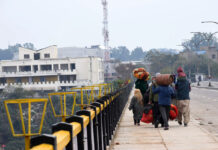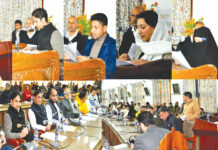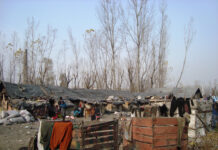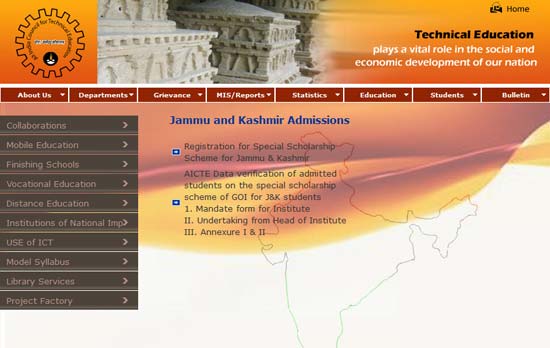No one knows if the local cable TV channels in Jammu and Kashmir are legally allowed to telecast news and current affairs programs, but the fact is that they have been allowed to do so in the past by the government. Although legal opinion exists against it as far as the existing federal cable TV news regulation law is concerned.
So, it can be said that telecasting news on these cable TV channels is illegal prima facie. But, for its convenience, the government is likely to lift the ban imposed during the 2010 unrest on news broadcasts by the local cable channels. The government may be keen keeping in view the upcoming municipal polls. But the local cable operators are not very optimistic about such a move.
They say the ‘discriminatory ban’ has severely affected their business and snatched livelihood of thousands of people associated with the local channels. The cable operators say even if the ban on broadcasting news is eventually lifted, the government might put conditions, and affect censorship.
“We are hearing from our sources that the government is thinking of lifting the ban but with some conditions like censoring the news,” says one of the heads of a local news channel that has been banned. “In case they allow us to broadcast news, we might have to first show the news script to the government authorities before it is aired.”
The ban on local TV channels for allegedly violating the cable Television Networks (Regulations) ACT, 1995, was imposed by the state government first in 2008, following the Amarnath land row. Although the ban was meant for both the regions of the state, in Jammu the ban was immediately lifted, while in Kashmir the ban was lifted a month after the summer agitation ended that year.
In 2009, when the twin rape and murder case in Shopian brought people on the streets, the local cable operators again found themselves at the receiving end of the government ire. They were asked to reduce the airtime of news. The cable operators complied with the government directions and were back on air soon after the crisis ended.
The biggest blow to the cable operators, however, came during the 2010 summer uprising, in which more than 115 youth were killed by the government forces. The government initially issued several ‘advisories’ to the local cable channels to ‘tone down’ their coverage. This was followed by a missive directing all local channels to slash airtime of news and current affairs shows from 24 hours to a mere 15 minutes at a stipulated time every day. As the situation worsened, the channels were asked to stop broadcasting news altogether on September 12, 2010
“We have told the cable operators to adhere to the Cable Network Act (1995) in letter and spirit as under this act they can’t telecast news,” the then Deputy Commissioner Srinagar, Mehraj Ahmad Kakroo, had told the local media.
The ban has continued so far. Kashmir Broadcasters Association, that has representatives from all the registered local cable channels, many times approached the government for lifting of ban, but to no avail. In June last year chief minister Omar Abdullah told a media conference that government will not allow local cable channels to broadcast news.“We are not going to allow local channels to broadcast news, not in the immediate future,” he said. His statement was followed by senior cabinet minister TajMohi-ud-Din sayingthat he would resign if the channels were allowed to broadcast news.
“I stand for banning these channels as they violate ethics and cause nuisance. Everybody cannot become journalist and these cable operators openly violate ethics of journalism through non-professionalism,” TajMohi-ud-Din said last month.
“I don’t want to lose a capable minister for a few channels. I will talk to the minister on the issue. I have no intention of changing my decision regarding the channels,” Omar had said.
 Last month, in the run up to the Jan 26 preparations, there were reports that the government had decided to review the more than a year-old ban on local cable news channels. “We have not taken any decision on lifting ban as of now. We will review it. If cable operators do not indulge in misinformation and disinformation campaign, government has no problem (to lift the ban). However any decision taken would not apply to foreign news channels banned in Kashmir,” Divisional Commissioner Kashmir, Dr AsgarSamoon had said.But this was followed by reports quoting a “close aide” of the chief minister that said“Omar wants the ban to continue.”
Last month, in the run up to the Jan 26 preparations, there were reports that the government had decided to review the more than a year-old ban on local cable news channels. “We have not taken any decision on lifting ban as of now. We will review it. If cable operators do not indulge in misinformation and disinformation campaign, government has no problem (to lift the ban). However any decision taken would not apply to foreign news channels banned in Kashmir,” Divisional Commissioner Kashmir, Dr AsgarSamoon had said.But this was followed by reports quoting a “close aide” of the chief minister that said“Omar wants the ban to continue.”
The local cable operators say they have time and again sought meetings with government officials to sort out issues regarding the ban. “Last time when we went with a representation of local channels to the government, Omar Abdullah clearly said that he doesn’t even want to meet us,” says AmjadHussian, one of the owners of SEN channel.
The chances of lifting the ban on local news channels seem bleak, says Amjad, as the government is wary of them. “If cable channels have to follow the cable act of 1995, it should be applied uniformly across the state,” he says. “Why cable channels in Jammu are allowed to function smoothly, while there is a ban on news channels in Kashmir?” he asks. “Why this discrimination?”
Cable TV operators from Kashmir say the government has not just kept a ban on news broadcasts, but they are even banned from showing programs on public issues.“We are not even allowed to telecast programs on social issues, and we are banned from showing business related news and programs,” says SanamAijaz, channel head of J-K Channel in Srinagar. “I tried to air a career related program in which I invited subject experts and academics, but we were unofficially told by the government authorities to stop airing even such programs.”
“The government has even kept a ban on broadcasting grievance related programs on civic issues,” says Amjad. “When it comes to broadcasting news that benefits the government, that time they send us directives from police and information department to air their news, but when we want to show news concerning people, we are not allowed,” he says.
At the time of elections in the past, he says, the government would ask them to air news about election campaigns and run their ads. “In fact they still owe us money for running their ads.”
In Jammu, Amjad says the local channels work without any hindrance or threat of any ban from the government. “They even get a steady supply of regular department ads from the government.”
Operators claimthe local cable channels directly or indirectly provided livelihood to around 10,000 people. AtSennews channel, he says they had a staff of around 80 people who lost their livelihood because of the ban.
“We have not been told whether the ban will be lifted in the near future. We are totally dependent on government’s decision,” says SuhailNisar, Executive Director of Mouj Kasheer Channel. “We have given all the documents to the government authorities in the past, but they are still not lifting the ban.”
Nisar says the ban has affected their business. “We used to generate eighty percent of our revenues from ads on the news channel, but that stopped after the ban,” he says.
The cable operators contend that in the Cable Act of 1995, there is no mention of any ban as such on broadcasting news. “What is mentioned is that we need to follow certain guidelines, like not creating animosity between different communities, maintaining harmony etc which we were always willing to follow,” says Sanam. He says the government put an unjust blanket ban on cable channels without seeking their views. “If there was any other rule, we would have followed that as well, but they just put a blanket ban on all the channels, and even on registered ones.”
Sanam says their channel did not violate the Cable Act even when the local cable channels were first banned from telecasting news during the 2008 uprising.“We presented both the versions and sought the government version as well,” he says. In 2010, he says, theyalso sought government version of events as the situation worsened.“But government officials were unwilling to come on record in front of the camera in 2010 when we would call them,” he maintains.“Then how can we be blamed by the government authorities that we showed only one version and violated the cable act?”
The Kashmiri operators say even if some channels violated rules or the Cable Act, the government could have talked with them to sort out issues, or taken some action against that particular channel. “But how can you justify a ban on all the cable channels. The entire community can’t be punished if someone violates rules,” says SanamAjaz.













